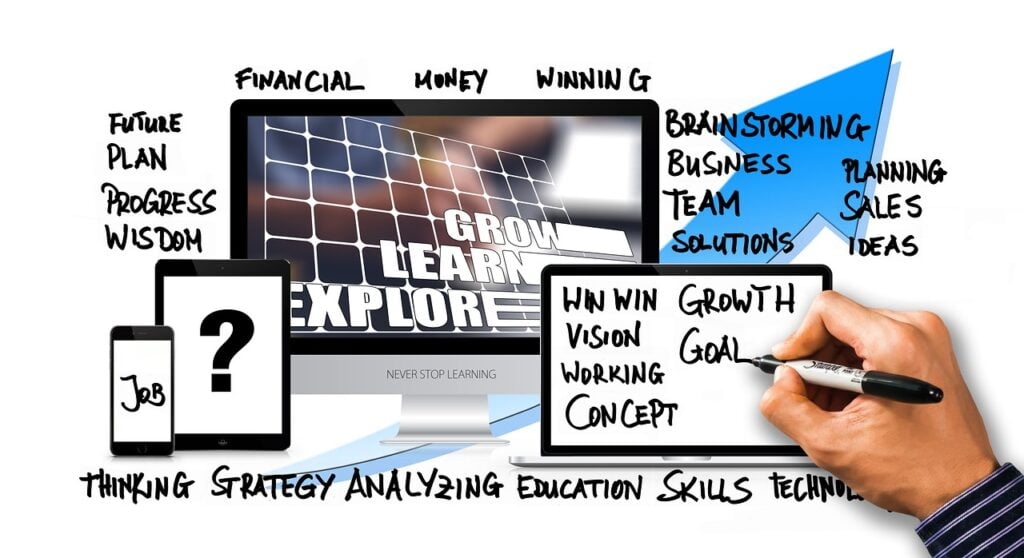Advancing your career requires a combination of hard work, dedication, and the right set of skills. In today’s competitive job market, it’s essential to continuously develop and improve your skills to stay ahead of the curve. Whether you’re just starting out in your career or looking to take the next step, focusing on career development and acquiring new skills can help you achieve your goals. In this blog post, we’ll explore the top skills for career development that can help you excel in your career and reach new heights.
Jump To Section
Why is Career Development Important?
Career development is the process of continuously improving your skills, knowledge, and experience to progress in your career. It’s an ongoing process that involves setting goals, identifying areas for improvement, and taking action to acquire new skills and experiences. Career development is important because it helps you stay relevant in your field, increases your value to your employer, and opens up new opportunities for growth and advancement.
Investing in your career development can also help you build confidence, increase your job satisfaction, and improve your overall well-being. By continuously learning and growing, you can adapt to changes in your industry and stay ahead of the curve. Career development is essential for anyone who wants to excel in their career and achieve their long-term goals.

What are the Essential Skills for Career Development?
To advance your career, there are certain skills that are essential for success. These skills include a combination of hard skills, which are specific technical abilities, and soft skills, which are personal attributes and interpersonal abilities. Here are some of the essential skills for career development:
- Communication skills: The ability to communicate effectively is crucial in any job. This includes both verbal and written communication, as well as active listening and the ability to convey ideas clearly and concisely.
- Problem-solving skills: Employers value employees who can identify problems, analyze situations, and develop effective solutions. Problem-solving skills are essential for career advancement, as they demonstrate your ability to think critically and make informed decisions.
- Emotional intelligence: Emotional intelligence refers to the ability to recognize and manage your own emotions, as well as the emotions of others. This skill is important for building strong relationships, resolving conflicts, and leading teams effectively.
- Technical skills: Depending on your industry, there may be specific technical skills that are required for success. These could include programming languages, data analysis, or other specialized skills. It’s important to stay up-to-date with the latest technologies and tools in your field.
- Leadership skills: As you progress in your career, you may be called upon to take on leadership roles. Developing strong leadership skills, such as the ability to motivate and inspire others, delegate tasks effectively, and make tough decisions, can help you advance your career.

How Can You Develop New Skills for Career Growth?
Developing new skills is an essential part of career development. Here are some strategies for acquiring new skills and knowledge:
- Take courses and workshops: Enrolling in courses or workshops, either online or in-person, can help you acquire new skills and knowledge. Many employers offer professional development opportunities, such as training programs or tuition reimbursement for relevant courses.
- Seek out mentors: Finding a mentor who has experience in your field can be a valuable way to learn new skills and gain insights into your industry. A mentor can provide guidance, advice, and support as you navigate your career path.
- Participate in job shadowing or rotations: Job shadowing or rotations can give you exposure to different roles and responsibilities within your organization. This can help you identify areas where you need to develop new skills and gain a better understanding of how different departments work together.
- Take on new challenges: Stepping outside of your comfort zone and taking on new challenges can help you develop new skills and gain valuable experience. This could include volunteering for a new project, taking on additional responsibilities, or even changing jobs to gain exposure to new industries or roles.
What Soft Skills are Important for Career Development?
While technical skills are important for success in many jobs, soft skills are equally essential for career development. Soft skills are personal attributes and interpersonal abilities that enable you to work effectively with others and excel in your career. Here are some of the key soft skills to consider:
- Communication: As mentioned earlier, strong communication skills are essential for success in any job. This includes the ability to listen actively, express yourself clearly, and adapt your communication style to different audiences.
- Collaboration: The ability to work effectively with others is crucial in today’s team-based work environments. Collaboration involves building strong relationships, contributing to team goals, and resolving conflicts constructively.
- Adaptability: In today’s fast-paced business environment, the ability to adapt to change is essential. This includes being open to new ideas, embracing new technologies, and being willing to learn and grow continuously.
- Time management: Managing your time effectively is crucial for meeting deadlines, prioritizing tasks, and achieving your goals. Strong time management skills can help you work more efficiently and reduce stress.
- Creativity: The ability to think creatively and come up with innovative solutions to problems is highly valued by employers. Creativity involves thinking outside the box, challenging assumptions, and finding new ways to approach challenges.

What are Some Examples of Technical Skills for Career Development?
Technical skills are specific abilities that are required for certain jobs or industries. Here are some examples of technical skills that may be important for career development, depending on your field:
- Programming languages: If you work in tech or a related field, knowledge of programming languages such as Java, Python, or C++ may be essential for success.
- Data analysis: The ability to analyze and interpret data is becoming increasingly important in many industries, from finance to healthcare. Skills in data analysis tools such as Excel, SQL, or R can be valuable for career advancement.
- Project management: Many jobs require the ability to manage projects effectively, from planning and budgeting to execution and evaluation. Knowledge of project management methodologies such as Agile or Scrum can be helpful.
- Digital marketing: As more businesses shift to online platforms, skills in digital marketing, such as social media management, email marketing, or search engine optimization (SEO), can be valuable for career growth.
- Design: Depending on your industry, skills in design tools such as Adobe Creative Suite or CAD software may be important for success.
How Can You Identify Areas for Skill Development?
To identify areas where you need to develop new skills, start by assessing your current skills and comparing them to the requirements of your desired job or career path. Here are some strategies for identifying areas for skill development:
- Conduct a self-assessment: Take some time to reflect on your strengths and weaknesses, and identify areas where you need to improve. Consider feedback from your manager, colleagues, or mentors to gain insights into your performance.
- Review job descriptions: Look at job descriptions for roles that interest you and identify the skills and qualifications required. Compare these to your current skills and identify any gaps.
- Seek feedback from others: Ask for feedback from your manager, colleagues, or mentors on areas where you can improve. They may have insights into skills that are important for success in your field.
- Stay up-to-date with industry trends: Keep an eye on industry trends and emerging technologies, and identify areas where you may need to develop new skills to stay competitive.
What are Some Strategies for Building a Strong Skill Set?
Building a strong skill set requires a combination of learning, practice, and experience. Here are some strategies for building a strong skill set:
- Set goals: Identify specific skills you want to develop and set goals for acquiring them. Break these goals down into smaller, achievable steps and create a plan for reaching them.
- Seek out learning opportunities: Look for opportunities to learn new skills, whether through formal training programs, online courses, or on-the-job experiences. Make learning a regular part of your routine.
- Practice regularly: Consistent practice is key to developing new skills. Set aside time each day or week to practice the skills you’re working on, and seek out opportunities to apply them in real-world situations.
- Seek feedback: Ask for feedback from others on your performance and use this feedback to identify areas for improvement. Be open to constructive criticism and use it to guide your skill development.
- Stay curious: Maintain a curious mindset and be open to new ideas and experiences. Seek out opportunities to learn from others and explore new areas of interest.

How Can You Demonstrate Your Skills to Potential Employers?
Once you’ve developed a strong skill set, it’s important to be able to demonstrate these skills to potential employers. Here are some strategies for showcasing your skills:
- Tailor your resume: Make sure your resume highlights the skills that are most relevant to the job you’re applying for. Use specific examples to demonstrate how you’ve applied these skills in previous roles.
- Create a portfolio: Depending on your field, creating a portfolio of your work can be a powerful way to showcase your skills. This could include writing samples, design projects, or code repositories.
- Prepare for interviews: Before a job interview, review the job description and identify the skills that are most important for the role. Prepare examples of how you’ve demonstrated these skills in previous roles and be ready to discuss them during the interview.
- Seek out opportunities to demonstrate your skills: Look for opportunities to demonstrate your skills outside of work, such as volunteering for a project or participating in a hackathon. These experiences can provide valuable examples to share with potential employers.
What Role Does Networking Play in Career Development?
Networking is an essential part of career development, as it can help you build relationships, gain insights into your industry, and uncover new opportunities. Here are some strategies for building a strong professional network:
- Attend industry events: Attend conferences, workshops, and other events in your industry to meet new people and learn about emerging trends.
- Join professional organizations: Joining professional organizations in your field can provide opportunities to network with others who share your interests and goals.
- Use social media: LinkedIn and other social media platforms can be powerful tools for building your professional network. Use these platforms to connect with others in your industry, share your work, and engage in discussions.
- Seek out mentors: Building relationships with mentors can provide valuable guidance and support as you navigate your career path. Look for opportunities to connect with experienced professionals in your field who can offer advice and insights.
How Can You Create a Career Development Plan?
Creating a career development plan can help you stay focused and motivated as you work towards your long-term goals. Here are some steps for creating a career development plan:
- Set goals: Identify your long-term career goals and break them down into smaller, achievable steps. Make sure your goals are specific, measurable, achievable, relevant, and time-bound (SMART).
- Assess your skills: Conduct a self-assessment to identify your strengths and weaknesses, and compare your current skills to the requirements of your desired job or career path.
- Identify areas for development: Based on your self-assessment, identify areas where you need to develop new skills or improve existing ones.
- Create an action plan: Develop a plan for acquiring the skills and experiences you need to reach your goals. This could include taking courses, seeking out new challenges at work, or building your professional network.
- Track your progress: Regularly review your career development plan and track your progress toward your goals. Celebrate your successes and adjust your plan as needed based on new information or changing circumstances.
Conclusion
Developing the right skills is essential for career advancement and success. By focusing on a combination of hard skills and soft skills, seeking out learning opportunities, and building a strong professional network, you can position yourself for long-term career growth. Remember that career development is an ongoing process, and it’s never too late to start investing in your skills and experiences. By creating a career development plan and staying focused on your goals, you can achieve the career success you desire.


